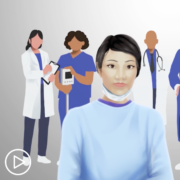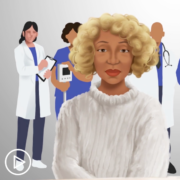Expert Insights into Kidney Cancer Risk Factors and Genetic Testing
Expert Insights into Kidney Cancer Risk Factors and Genetic Testing from Patient Empowerment Network on Vimeo.
What is known about kidney cancer risk factors and genetic testing? Expert Dr. Moshe Ornstein from Cleveland Clinic explains known risk factors for kidney cancer and situations when he recommends genetic testing for patients.
See More from START HERE Renal Cell Carcinoma (RCC)
Related Resources:

|

Exploring Renal Cell Carcinoma Research | Expert Insights on Immunotherapy and Targeted Therapy |

Renal Cell Carcinoma Clinical Trials | A Deep Dive into the Latest Advancements |
Transcript:
Lisa Hatfield:
We have a patient asking if you can speak to a typical patient history associated with kidney cancer and is there a common factor, or I think that they’re asking is there a cause that you see frequently for kidney cancer?
Dr. Moshe Ornstein:
Yeah, this is such a common question, Lisa, because patients want to know I have this cancer, what caused it? And generally, we just don’t know the answer to that. And I tell that to patients, it’s generally not something that somebody did that caused this kidney cancer. We do have known risk factors for kidney cancer, whether it’s obesity, smoking, high blood pressure, chronic kidney disease. So there are certain risk factors and associations, but it’s really difficult for a specific patient to be able to pinpoint this caused the kidney cancer. And I think it’s reassuring for patients to know that as a general rule, it’s not something that a patient did that caused the kidney cancer, and it’s not somebody’s fault that they have the kidney cancer.
Lisa Hatfield:
Okay. Thank you for that. So when you have a patient who comes in with those more unusual presentations, do you recommend that they get some type of genetic testing done, so they can be aware for their family members that maybe they should be screened?
Dr. Moshe Ornstein:
Yeah, absolutely. I mean, if there’s an unusual feature, either a feature associated with tuberous sclerosis complex or something called Birt-Hogg-Dubé, or a young patient with advanced kidney cancer where we don’t expect it, or a patient that shows up with cancer in both of their kidneys and nowhere else, that will trigger us to send the patient to a genetic counselor to do a more thorough family history and talk about what they might be looking for in terms of genetic testing.
Lisa Hatfield:
Okay. Thank you. All right. Another person watching is asking, are there known occupational exposure risk factors for kidney cancer?
Dr. Moshe Ornstein:
This is a great question. You know, we know that with certain cancers, there are classic occupational exposure risks. People want to know, “If I worked in a coal mine, am I more likely to get this kind of kidney cancer? What if I’m a Vietnam veteran and I was exposed to Agent Orange, is this more likely?” Really difficult to find those associations. I would say that probably the biggest ones are going to be, again, smoking, which I don’t know is so much an occupational hazard, although secondhand smoke is a real risk factor for cancers. Asbestos.
So people who worked around a lot of asbestos, that can be a risk factor even for kidney cancer. I know we usually think about it as lung cancer mesothelioma, but definitely for kidney cancer as well in some studies. And then certain forms of gasoline exposure. I will tell you that I’ve taken care of a lot of patients and a lot of people who have kidney cancer and have never been able to isolate an occupational exposure. But looking in the literature, we’re really looking more for asbestos, certain gasoline, secondhand smoke, things like that.
Share Your Feedback
Create your own user feedback survey






